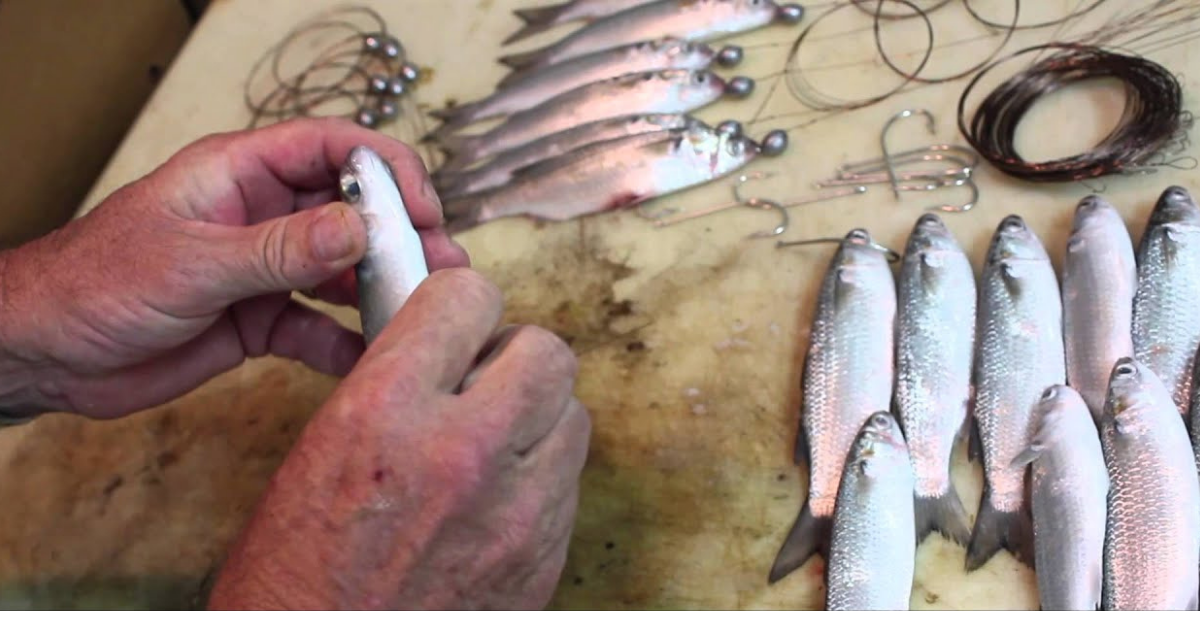Article Courtesy: coastalcarolinafisherman.com | Originally Published: 7/30/2021 | Click here for original article
The “Rigged Swimming Mullet”— A Lost Art
The “Swimming Mullet”– I proclaim as one of the best and most productive trolling baits ever presented to an offshore pelagic gamefish. Unfortunately, I have noticed through the years that this unique part of a topwater trolling spread is not used frequently like in years past. I think it has been somewhat lost through time in the myriad of bait presentation options, with many younger fishermen never being introduced! But I encourage all anglers to introduce the original Swimming Mullet as a part of your natural bait trolling spread.
 If you are a topwater trolling angler, I’m sure you will agree that nothing is more exciting in a day’s fish’n than to watch your rigged natural baits swim in your vessel’s wake. We take pride in our spread and the presentation in different seas and conditions. It’s an art. Personally, I want to see my baits “at all times” and most of them are close to the boat. Outriggers increase the bait’s action and work perfectly in presenting the Mullet to Gamefish. Most anglers find the topwater strike as the most exciting part of the catch or the miss. Seeing your baits always increase your chances, especially for Billfish when they pick their way through your spread. This provides a better opportunity to not miss a bill strike and to free spool a strike once it occurs.
If you are a topwater trolling angler, I’m sure you will agree that nothing is more exciting in a day’s fish’n than to watch your rigged natural baits swim in your vessel’s wake. We take pride in our spread and the presentation in different seas and conditions. It’s an art. Personally, I want to see my baits “at all times” and most of them are close to the boat. Outriggers increase the bait’s action and work perfectly in presenting the Mullet to Gamefish. Most anglers find the topwater strike as the most exciting part of the catch or the miss. Seeing your baits always increase your chances, especially for Billfish when they pick their way through your spread. This provides a better opportunity to not miss a bill strike and to free spool a strike once it occurs.
When a mullet is rigged with a chin weight, It simply will dive with great excitement, only to surface and lay out flat on the top of the sea on its side for a few seconds exposing its broad silver side. Then it will dive back down to swim like a champ exposing the broad body laterally. When you have a top spread of at least two rigged Mullet in there, you are creating a scene of a school of baitfish in pure panic. You will be amazed at the commotion that 4 to 6 can create.
Basics of the Swimming Mullet
You can catch your own (silver Mullet), brine them, notch their heads, de-bone them, and split their tails. That works!! Or you can do as I do and simply buy fresh frozen deboned/split-tailed mullet ready to rig. They usually come in packs of 2 to 5 depending on size. Any good tackle shop will have them, can order them, or you can order online from several reputable bait dealers that will deliver to your doorstep on dry ice. Frozen, deboned Mullet are not cheap but that is the way to go!
Gear
Simplicity works—All you need is the following:
- Split-tail deboned silver Mullet – 10 to 12 inches each.
- Single strand leader wire preferred (or heavy mono)
- Chin weight (small to large depending on the effect you want)
- Rigging floss or twine
- Rigging needle
- Colored Skirt (optional)
Simple assembly
- For wire, make a haywire twist for the snap swivel end on a leader about 12 ft. long. I use 105 to 180 lb Malin wire depending on the species sought.
- Thaw baits as needed throughout the day in a saltwater bucket and store them on ice.
- Size hook to bait size but use a round hook eye. Make a slit in the belly for hook insertion. Also, poke a hole on the top of the bait’s head behind the mouth extending into the gill cavity.
- Turn bait upside down, slide hook in belly slot, and open the gill plate with thumb where you can see the eye of the hook. Insert the tag end wire with chin weight on the leader from the underside, through the eye of the hook and then through the hole you made in the head. Complete by snugging up chin weight just under and behind the mouth and finish with another haywire twist on the existing leader wire.
- Use waxed floss to make 4 wraps snuggly around the head to keep gill plates shut tight. Secure with a simple knot.
- For added bait and hook stability, I use a rigging needle with floss and put a single stitch just under the shank of the hook and tie a knot across the mullet’s back. This helps keep the bait and hook from separation during violent strikes.
Note: you can use circle hooks too, including rigging a circle hook in front of the whole bait and securing the hook with a few simple tight stitches through the Mullet’s lip with the rigging needle. But make sure to wrap the gill plates with a few good wraps of floss. The bight of a hook is placed upward. A light-weighted skirt slid down to the hook works well and will hide the exposed hook. Go Catch a smoker!






